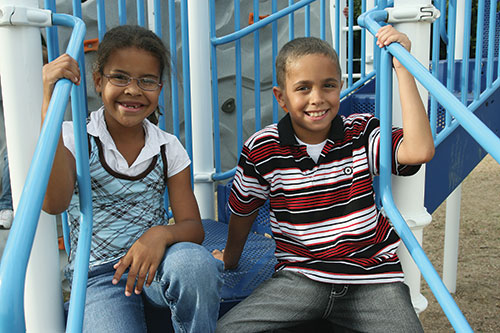Teaching Children the Art of Making New Friends
 As each new school year begins, your child will be excited about meeting new teachers, reuniting with old friends and possibly forming some new friendships.
As each new school year begins, your child will be excited about meeting new teachers, reuniting with old friends and possibly forming some new friendships.
Making new friends can sometimes be a daunting prospect for both kids and parents. Here are some helpful hints for how you can make the adventure of widening your child's social circle a little easier and a lot more pleasant.
What You Can Teach YOUR CHILD to Do
-
Friends are a gift we give to ourselves, but our choices can sometimes lead to trouble. Choose friends who have interests that are similar to yours. Healthy friendships should make you feel good and proud, not leave you feeling small.
- Keeping in line with these positive traits will have a positive influence on your conduct and, ultimately, your reputation. And the better your reputation, the more choices you'll have for friends.
-
Be interested, rather than interesting. People like knowing that you legitimately care. It's better to show interest than to be the show.
-
Shift your focus from worrying about what others think to making them feel comfortable. This can reduce anxiousness and help them engage with ease.
-
Use effective social skills. Make eye contact, ask open-ended questions, stay on topic, take
turns talking, try not to interrupt and make comments that show you're listening.
-
Practice using your social skills. Don't just be around people; interact with them. The more you practice, the more at ease you will feel.
-
Set healthy boundaries with friends. It's okay to say “No" when you feel overextended or when you don't agree with their choices.
-
Notice others' cues. If they're looking away, then it may be time for a new topic or for a conversation to end. Other cues include extended silence, tone and rate of speech.
-
Praise others and make positive comments to put them at ease and invite conversation.
-
Last, but never least – be yourself. People can tell if you're genuine. Being something you're not wastes energy that can be used for more important things, like having fun.
 What YOU Can Do
What YOU Can Do
It's easy for us as parents to get caught up in our children's social lives. Sometimes, kids get their feelings hurt, feel rejected or align themselves with peers who leave us feeling uneasy. It's also difficult to watch our kids make mistakes, and with so much social media out there, it's easy to be in on every detail of what they're involved in. Here are some tips to help you guide your child toward positive friendships without interfering too much:
-
Model appropriate and healthy social skills; your kids are watching.
-
Talk about family values and equip your child with support systems.
-
Be open and honest with your child if you have concerns about his or her friends. Demonstrating overt dislike for them may
only make them more interesting to your child. -
Let your child learn from experiencing the ups and downs of relationships. While this sometimes means heartache, it also allows for healthy growing opportunities. It's better for your kids to make mistakes while they're still flying with a net (you) than when they're on their own.
-
Never address your child's social skill deficits publicly as this can create anxiety and self-consciousness. The best way to provide feedback is by “catching" your child doing well.
Having said all that, it's important that you get to know your child's friends and, if possible, their parents. The key to teaching your child how to develop positive relationships is finding the balance between being aware of what's going on and resisting the urge to be too involved in your child's social life.
Additional Resources
-
Making Friends Is an Art! by Julia Cook
-
Why Don't They Like me? by Susan Sheridan, Ph.D.
-
Helping the Child who Doesn't Fit in by Stephen Nowicki, Jr., Ph.D. and Marshall Duke, Ph.D.
-
Teaching Your Child the Language of Social Success by Marshall Duke, Ph.D., Stephen Nowicki, Ph.D. and Elizabeth Martin, M.Ed.
Download Printable Version
Kid Tips;Communication Skills
